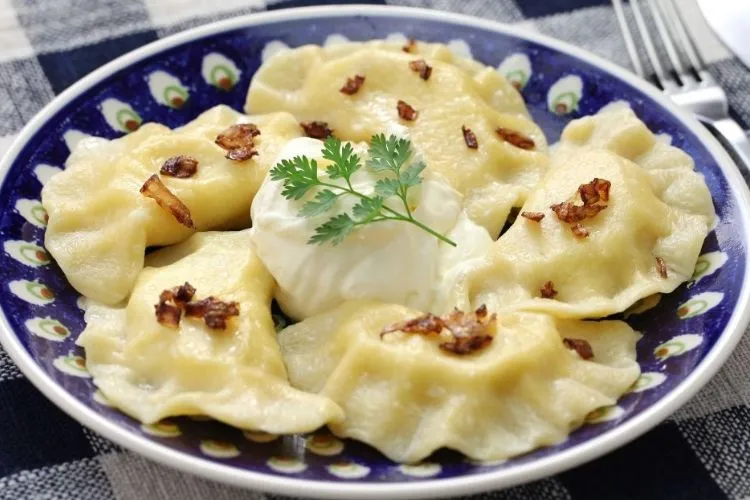Pierogies, the beloved Eastern European dumplings, have captivated taste buds around the world with their savory fillings wrapped in a tender dough.
As pet owners indulge in these delicious treats, a common query arises: Can dogs eat pierogies?
This article delves into the compatibility of pierogies with a dog’s diet, examining the potential risks and nutritional considerations to ensure the well-being of our furry companions.
🐾 Can dogs eat pierogies?
Yes, dogs can eat pierogies in moderation, but it’s not advisable to make them a regular part of their diet. Pierogies are dumplings made from dough and usually filled with potato, cheese, or meat, and these ingredients are not toxic to dogs.
However, you need to be cautious about additional ingredients like onion, garlic, and excessive salt or spices, which can be harmful to dogs.

Pierogies also contain carbohydrates and fats that can contribute to unhealthy weight gain if fed in excess. Additionally, if your dog has a sensitive stomach or dietary restrictions, pierogies might cause gastrointestinal issues.
Always consult with your veterinarian before introducing new human foods to your dog’s diet to ensure it’s safe. If you choose to feed your dog pierogies, do so sparingly and ensure they are plain and unseasoned.
🐾 Potential Risks Associated with Common Ingredients in Pierogies for Dogs
Pierogies, while a delightful treat for humans, contain ingredients that can pose various risks to dogs. Understanding these can help pet owners make informed decisions about their furry friends’ diets.
Onions and Garlic
- Risk: Both onions and garlic are toxic to dogs, causing oxidative damage to red blood cells and leading to anemia. Even small amounts can be harmful.
- Symptoms: Symptoms of toxicity include weakness, lethargy, pale gums, and in severe cases, kidney damage.
Dairy Products

- Risk: Many pierogies contain cheese or are served with sour cream. Some dogs are lactose intolerant and cannot digest dairy properly, leading to gastrointestinal upset.
- Symptoms: Consuming dairy can result in diarrhea, vomiting, and stomach pain in sensitive dogs.
High Salt and Fat Content
- Risk: The dough and fillings in pierogies often contain high levels of salt and fat, which are not suitable for dogs. Excessive salt intake can lead to sodium ion poisoning, while too much fat can cause pancreatitis.
- Symptoms: Symptoms of high salt intake include excessive thirst and urination, while pancreatitis symptoms include vomiting, diarrhea, and abdominal pain.
Spices and Seasonings
- Risk: Spices used in pierogies, such as black pepper and herbs, may not be toxic but can cause gastrointestinal irritation in dogs.
- Symptoms: Dogs may experience mild to severe stomach upset, depending on the amount ingested.
In summary, while the occasional small piece of plain pierogi might not harm a dog, the potential risks associated with the common ingredients make it advisable to avoid feeding pierogies to dogs.
Instead, focusing on dog-safe treats and foods is the best way to keep them healthy and happy.
🐾 Safe Feeding Practices and Alternatives to Pierogies for Dogs
While pierogies might not be the ideal treat for dogs due to their potential risks, pet owners can still share the joy of snacking with their furry companions by adhering to safe feeding practices and choosing healthier alternatives.

Safe Feeding Practices
- Moderation is Key: If you decide to give your dog a piece of pierogi, ensure it’s plain (no onions, garlic, or rich sauces) and given in very small amounts as a rare treat.
- Monitor for Allergies: After feeding any new food, watch your dog for any signs of allergic reactions or gastrointestinal distress.
- Consult Your Vet: Always consult with your veterinarian before introducing new foods into your dog’s diet, especially if your dog has preexisting health conditions.
Healthy Alternatives to Pierogies
- Homemade Dog Treats: Prepare simple, dog-safe treats at home using ingredients like pumpkin, sweet potato, carrots, and lean meats. These can be baked or cooked without any added salt, spices, or fat.
- Commercial Dog Treats: Opt for high-quality, commercially available dog treats that are formulated to meet your dog’s nutritional needs. Look for treats with whole food ingredients and minimal additives.
- Fruits and Vegetables: Many fruits and vegetables, such as apples (without seeds), bananas, carrots, and green beans, can be great low-calorie snacks for dogs. Always introduce these in small quantities to avoid digestive upset.
By choosing these safer alternatives and following prudent feeding practices, you can ensure that your dog enjoys their treats without any adverse health effects.
Remember, treats should not make up more than 10% of your dog’s daily caloric intake to maintain a balanced diet.
When pondering if your pooch can partake in human foods like pierogies, it’s equally important to consider other dishes such as cilantro lime rice and even a classic Caesar salad. Each food carries its unique set of ingredients that could impact your dog’s health, so it’s crucial to dissect the components of these meals before offering a bite to your furry friend.
Conclusion:
While dogs can technically eat pierogies and may enjoy them as an occasional treat, these should not be a routine part of their diet, due to the potential presence of harmful ingredients and excessive carbs or fats.
In particular, elements like onions, garlic, and spices that are often used in pierogies can adversely affect dogs’ health.
Furthermore, for dogs with sensitive stomachs or pre-existing health concerns, the intake of such human foods might lead to digestive issues.
Therefore, always consult with a veterinarian before introducing any new food items to your dog’s diet. Moderation is key in maintaining a balanced and healthy diet for your furry friend.
